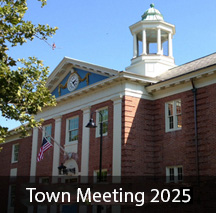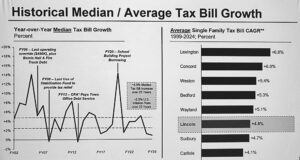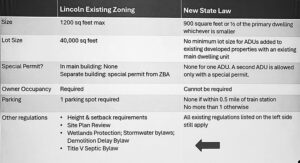 Lincoln’s Annual Town Meeting set a non-pandemic record for brevity, wrapping up in under three hours as every warrant article was approved by unanimous voice vote in a rare controversy-free edition.
Lincoln’s Annual Town Meeting set a non-pandemic record for brevity, wrapping up in under three hours as every warrant article was approved by unanimous voice vote in a rare controversy-free edition.
Perhaps the most interesting aspect of the March 29 meeting was the confluence of past and future. It started out with a demonstration of the new voting clickers and later moved to a reenactment of Lincoln residents debating at a 1775 Town Meeting whether to allocate money for the war that many saw coming (see related story and “My Turn” piece).
Votes approved funding to buy the clickers last year and were thrilled on Saturday with the instant tallies during a test run, when they were asked to indicate whether this was their first Town Meeting or not (result: 149 no, 24 yes). They also tested the multiple-choice function. Ranked-choice voting will be an option in the future.
Saturday’s vote means that “we can add clickers to the list of techniques that the town moderator can use to ask for a vote,” Select Board member Jim Hutchinson explained. Voice votes will be the first go-to method and standing votes are still an option, but it’s at the discretion of the moderator. The only substantive and unavoidable change from traditional vote-counting is that voting by clicker is anonymous, so attendees can’t see how their neighbors are voting on an issue.
Hutchinson also encouraged officials to use the clickers to get a sense of attendees at future Town Meetings and those of boards and committees even if it’s not a formal vote. “We believe this is a good way to get more feedback from residents,” he said.
Budget
Revenues and expenses will grow by 7.9% in the budget approved for fiscal 2026. However, property owners will see a tax increase of only 0.9%, largely due to the Finance Committee’s use of $902,000 from free cash for tax relief. It’s a big change from 2020, when the tax rate ballooned by 14% due to borrowing for the school renovation project. “Preferred items” that were approved in addition to the FY26 base budget included a new police officer (the first in 25 years) and a part-time administrative assistant in the Planning Office.

These two charts show how Lincoln’s property tax rate has grown over the last decade in comparison to neighboring towns (click image to enlarge).
Future town budgets will be more unpredictable than usual, given the “sweeping and rapidly evolving” presidential orders on public health education, the environment, immigration, and more, said Select Board Chair Kim Bodnar. Pending the outcome of a flurry of legal challenges, “we have insufficient information to warrant making changes to budget and programs” in Lincoln, but the town will need to “evaluate what we need to do to maintain compliance with federal laws… while remaining true to the town’s vision statement and commitment to keeping Lincoln a welcoming community for all our residents, students, staff and visitors.”
Town Meeting Study Committee
Andrew Pang reported on the work of the committee, which was formed after last year’s controversial Annual Town Meeting (ATM) debate and vote on Housing Choice Act rezoning. Among its accomplishments so far:
- The pre-ATM moderator’s meeting, seen by some as “proverbial smoke-filled room,” is now hybrid for greater transparency.
- Publication of a Town Meeting primer
- A two-minute timer visible to those who speak at the audience microphones, though by law, the moderator reserves the right to allow speakers to go longer. The group is also working on improvements to the audiovisual technology that’s used when an overflow room such as the Reed Gym is used.
Pang acknowledged that there have been “perceptions that differing viewpoints were not welcome” and said that the committee is “working on digesting and assimilating those comments [and will then] develop criteria and rules.” Other suggestions that the group is studying are having separate sessions for Town Meeting debate and voting; allowing remote participation in debate, which is complex from a technical standpoint. Remote voting is not permitted by state law, nor is absentee or early voting, he noted. Most would agree that boosting Town Meeting turnout is desirable, though Lincoln had the highest average rate in the immediate area in 2014-2023 (8.4% of registered voters, vs. a low of 3.7% in Bedford).
Pang urged residents to offer feedback on how Town Meeting went using this website, which the committee will consider as it reviews the primer and makes future recommendations. They expect to issue its final report to the Select Board in October and to residents at the November State of the Town meeting.
Water Enterprise Fund
Voters approved a bond issue of $6.79 million to fund Water Department projects, chiefly a water main replacement through the center of town for $6.2 million. Department Superintendent Darin Lafalam recapped his March 4 public hearing presentation outlining Lincoln’s aging water main infrastructure as Water Commission member Steve Gladstone noted that the town has never replaced an entire water main. Bids just came in for the first of two phases from the top of the hill on Bedford Road down Lincoln Road to Ballfield Road and were in line with estimates; work on that piece will take place this summer.
The bond interest and principal will be repaid from water rates, which rose 10% this year and are slated to do the same in the next two years as well.
Zoning amendments

A comparison of Lincoln’s previous ADU regulations (left), and what voters adopted last week to align with new state law (click image to enlarge).
Voters also approved zoning bylaw amendments to have the town’s rules on accessory dwelling units (ADUs) follow recent changes in state law. Those changes relax the rules around units of up to 900 square feet, though the town retained additional restrictions on units from 900 to 1,200 square feet. ADUs up to 900 square feet are now allowed by right with no special permit required.
Asked why the town didn’t simply adopt the same rules for all ADUs rather than keeping different ones for larger units, Planning Board Chair Margaret Olson said, “the Planning Board prefers to make small incremental changes [because] it’s extremely difficult to get regulations right.” It may make further changes in the future; “we’ll see what happens… but we’re making the minimum necessary changes today.”
Leave a Reply